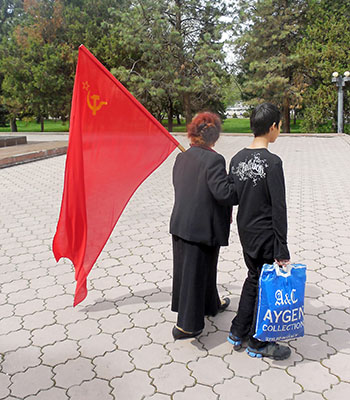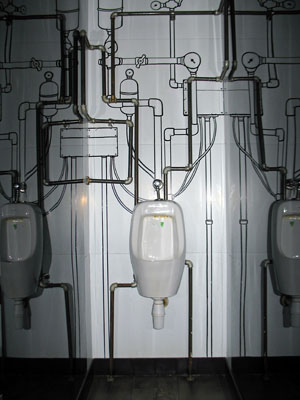Bischkek
Refrain:
Бишкек, я тебя люблю,
я не знаю почему …
Bishkek, deine Milizisten
leben nicht vom Lohn allein.
Wenn sie dich zur Seite winken,
dann selten, um dir zum Feiertag zu gratulieren.
Bishkek, deine süßen Torten
stehen am Tresen aufgereiht,
locken mit dick aufgetragenen Cremes –
wer wird ihre Zuckerblumen brechen?
Bishkek, deine Skater cruisen
zwischen Frack und Abendkleid,
und sie wissen was gespielt wird
unter den Stalinaktiten.
Bishkek, deine Veteranen
tragen noch den Sowjetstern;
ihre Enkel, die sie führen,
tragen eher Plastiktüten.
Bishkek, deine Klempner
sind unheimlich kreativ
und sie wären gerne Künstler geworden –
ach, könnten sie doch dichten!
Hraban 2014
Zusatzstrophen:
Bischkek, deine Krankenwagen
stammen noch vom letzten Krieg.
Bis sie dich zum Arzte tragen
bist du auch mit gebrochenen Beinen selbst hingelaufen.
Bischkek, deine Straßenköter
zieh’n im Rudel durch die Stadt.
Und wenn sie am Straßenrand liegen
weiß man nicht, ob sie schlafen oder überfahren wurden.
Bischkek, deine Frunses
ha’m ihr Haus in einem Haus
und reiten ewig gen Süden,
erlegt von Stalins Chirurgen.
Bishkek (translation)
Chorus:
Bishkek, I love you, [also the title of a TV show]
I don’t know why …
Bishkek, your milicemen [militiamen/policemen]
don’t live on wage alone.
If they motion you aside,
then seldom to wish you happy holidays.
Bishkek, your sweet torts
are standing in line on/at the counter/bar,
allure you with thickly applied cremes –
who will break their sugar flowers?
[
This verse plays with sexual ambiguities, matching cakes with prostitutes:
Torte – also for a woman with a lot of make-up
Tresen – counter in a shop or (in) a bar
Creme – ambiguous like in English
Zuckerblumen brechen – overly poetic for deflower
]
Bishkek, your skaters are cruising
between coats and gowns,
and they know what they’re playing
under the stalinactites.
[
The square in front of Philharmonic Hall is a popular hangout for skaters, BMXers etc.
In German, „skaters“ means only skateboard riders; they use „cruise“ for leisurely skating around – don’t know if the usage is different in English.
Third line is ambiguous – I say the skaters know what’s on stage, but also what (political) games might be played.
Stalinactites is my word for the lusters in Philharmonic Hall, because they look like hanging (stalactites) Stalin-era palaces.
]
Bishkek, your veterans
still wear the Soviet star;
their grandchildren, who guide them
rather carry plastic bags.
[
„tragen“ means to wear and to carry.
„die sie führen“ can mean grandchildren guiding the elderly, but also veterans leading the youth.
See also the picture above.
]
Bishkek, your plumbers
are amazingly (fucking?) creative [unheimlich: literally uncanny, somewhat ironically used]
and they would have preferred to become artists – [Künstler: artist, e.g. painter, poet, performer]
if they only could seal! [dichten: to caulk/seal, but also to make poetry]
[Additional verses, not in the recording:]
Bishkek, your ambulances
are still from the last war,
before they carry you to the doctor,
you walked there yourself even with broken legs.
Bishkek, your stray dogs (mutts),
stroll(?) across the city in a pack.
If they’re lying at the roadside,
you never know if they are sleeping or overrun.
Bishkek, your Frunzes [Michail Frunze was a Soviet general, and Bishkek was called Frunze in Soviet times]
have their house in a house [Frunze’s birth house is preserved in a museum that was built around]
and are riding southward forever, [There’s an equestrian statue of Frunze in front of the railway station, facing south]
culled(?) by Stalin’s surgeons. [erlegt: killed like game; M. Frunze was supposedly killed by a surgery in Moskow]

